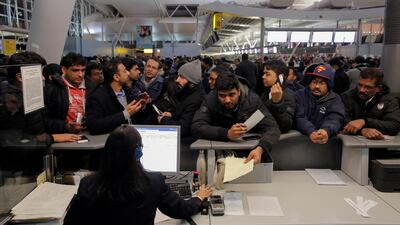Last weekend a friend of mine was trying to sell his car using one of those companies that offers to buy your motor in minutes. These organisations usually advertise their wares by suggesting that the process is a relatively hassle-free way to dispose of an asset: get an instant valuation, do some light horse-trading over a price, shake hands on an agreement and walk away with a fistful of dirhams.
It didn’t turn out to be a good experience. The company's representative arrived late for the allotted appointment. The evaluation process took hours not minutes. The price he offered for the car was derogatory and the whole affair was punctuated with numerous suggestions of a better price to come, which never actually materialised.
My friend walked away feeling frustrated. I expect he will now end up selling the car privately.
His story begs a broader conversation. Most of us have had a bad experience with a company we have interacted with. Many people have come to think decent customer service is an impossibility. But is it really that bad or do we have unrealistic expectations of how our interactions will play out?
Earlier this year I was unlucky enough to fall victim to credit card fraud. I wrote about it previously on these pages. Thieves stole Dh18,500 in a single transaction at a London department store while I was in Abu Dhabi. It took almost two months to get the money back and a further four weeks for all the charges the bank had applied to the debt in the meantime to be refunded.
It was an enormously stressful time, one that was made worse by being stuck for weeks on what our personal finance editor Alice Haine describes as the “call centre carousel”. Every time I called the bank – and I did so frequently – to chase up my case, I had to explain the details all over again.
I was already frustrated at having fallen victim to credit card crime, but the situation was exacerbated by the lack of knowledge and care of those who answered my calls. It took a trip to one of the bank's branches and a sit-down with an assistant manager to finally sort the situation out.
The report card on the whole incident was mixed: the bank scored poorly on its call centre staff – they weren’t empowered to fix anything or empathetic to my situation – but it reflected positively on the branch, where I was treated with courtesy and understanding.
At Abu Dhabi International Airport recently, I experienced an altogether rougher version of customer service. Arriving in good time to check-in – there were only three people in front of me in the queue – I waited 45 minutes to check my bag in. As the minutes ticked by and it became obvious that the family at the front of the queue had a complex ticketing problem, the line began to swell and passengers started to get visibly frustrated.
Although I was never likely to miss the flight, what was clearly lacking was a duty manager who was willing to step in and shift the queue to another desk or set the family aside and assign a member of staff to deal with their issue. There were plenty of staff milling about who could have intervened, but they didn’t.
Abu Dhabi is intent on growing its tourism trade and has made great strides over the past few years: visitor numbers are on the up and the city's portfolio of attractions continues to grow, but if it's too much hassle to get into and out of the airport, then visitors may decide not to come back for a repeat visit.
Word soon gets around, although it should also be said that the awfulness that can be Heathrow and JFK does not deter tourists from beating a trail to London or New York.
This week, Etihad Airways launched a WhatsApp business service that it says will allow guests to chat directly with customer service staff. It’s a good idea, although as it will only be available to so-called “premium” guests, it will have limited scope, initially at least.
I have some scepticism about this, as many companies are good at running social media channels to interact with customers but are bad at actually solving problems.
My bank has a very active Facebook and Twitter team who soon tired of my credit card fraud issue when it became obvious that there wasn’t a quick fix to be had. On the flip side, Etisalat, the telecoms company, resolved a problem I had within minutes on their “chat with us” function recently, which suggests these platforms can work if properly set up.
If there is a common point that binds the examples I cite in this column, it is that investment needs to be made in people and training. Too many companies install world-class systems and then forget that people make businesses, not workflows and management charts.
The absence of adequate training to back up the systems also explains why my friend left his appointment in his own car rather than in a taxi having sold it.
If managers don’t understand the business or the importance of its customers, then their staff will inevitably deliver an inadequate service.
Businesses need to adopt “black box thinking”. Just like airlines become safer every time they investigate an incident, so businesses need to deconstruct their mistakes and learn from them. If they do, we will all benefit.
Nick March is assistant editor-in-chief of The National


